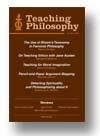
Teaching Philosophy
Scope & Guideline
Bridging Philosophy and Pedagogy for a Deeper Understanding
Introduction
Aims and Scopes
- Pedagogical Innovation in Philosophy:
The journal emphasizes novel approaches to teaching philosophy, encouraging educators to experiment with and share effective strategies that foster critical thinking and engagement among students. - Diversity and Inclusion in Philosophical Education:
A consistent theme is the journal's commitment to incorporating diverse philosophical traditions, including non-Western philosophies, indigenous knowledge, and contemporary ethical issues, promoting a more inclusive curriculum. - Philosophical Methodologies and Practices:
The journal explores various methodologies for teaching philosophy, including comparative philosophy, experiential learning, and the integration of technology in philosophical inquiry. - Ethics and Social Justice in Philosophy Education:
There is a strong focus on the ethical dimensions of teaching, with discussions around social justice, civic engagement, and the role of philosophy in addressing contemporary societal problems. - Interdisciplinary Approaches to Philosophical Education:
The journal often features interdisciplinary perspectives that connect philosophy with fields such as psychology, artificial intelligence, and environmental ethics, enriching the learning experience.
Trending and Emerging
- Integration of Technology in Philosophy Education:
There is a marked increase in discussions surrounding the use of technology, particularly large language models like ChatGPT, in teaching writing and philosophical inquiry, highlighting the relevance of digital tools in modern education. - Ethics and Philosophy in Social Contexts:
Emerging themes focus on ethics in various contexts, such as bioethics, environmental ethics, and the ethics of technology, reflecting a growing concern for how philosophical education can address pressing societal issues. - Comparative and Global Philosophical Perspectives:
An upward trend in comparative philosophy and the inclusion of global philosophical traditions signifies a shift towards a more inclusive understanding of philosophy, encouraging educators to engage with a broader spectrum of philosophical thought. - Student-Centered Learning and Engagement Strategies:
The journal is increasingly exploring student-centered pedagogies, including active learning, reflective practices, and collaborative approaches, which aim to enhance student engagement and ownership of their learning. - Philosophy in Crisis Contexts:
Publications reflecting on teaching philosophy during crises, such as the COVID-19 pandemic, indicate a growing interest in how philosophical education can adapt to and address challenges brought on by societal disruptions.
Declining or Waning
- Traditional Western Philosophical Canon:
There appears to be a decreased emphasis on the traditional Western philosophical canon, as the journal increasingly prioritizes diverse philosophical perspectives and methodologies, indicating a shift towards a more globalized approach to philosophical education. - Conventional Assessment Methods:
There is a noticeable decline in discussions around conventional assessment methods in philosophy education, such as standardized testing and traditional grading systems, as educators explore more innovative and holistic assessment practices. - Philosophy as Abstract Theory:
The focus on philosophy as an abstract theoretical discipline has waned in favor of practical applications and real-world relevance, with fewer publications centered solely on theoretical discussions without practical implications.
Similar Journals

Philosophies
Navigating the complexities of thought and inquiry.Philosophies is a leading open-access journal published by MDPI, dedicated to advancing research in the fields of Philosophy and the History and Philosophy of Science. Established in 2016 and located in Switzerland, this journal aims to stimulate scholarly dialogue and innovation by providing a platform for diverse philosophical perspectives and interdisciplinary approaches. With a commendable impact factor and ranking—Q2 in both Philosophy and History and Philosophy of Science in 2023—Philosophies stands out in the academic community with Scopus rankings placing it in the top tiers of its categories (Rank #176/806 in Philosophy and Rank #65/223 in History and Philosophy of Science). Authors and researchers are encouraged to submit their works as this journal continues to foster open access to knowledge, enabling global dissemination and collaboration among experts and enthusiasts alike. Join us in exploring the profound questions that shape our understanding of the world and human experience.
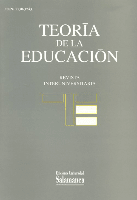
Teoria de la Educacion
Fostering Critical Dialogue in Educational DiscoursesTeoria de la Educacion is a leading academic journal published by EDICIONES UNIV SALAMANCA, specializing in the fields of Education and Philosophy. With an impactful history since its inception in 1986, the journal operates under an open-access model, ensuring that vital research reaches a broad audience without financial barriers. Based in Spain, this journal not only boasts high visibility with its Q1 rankings in both Education and Philosophy but also achieves notable standings in Scopus rankings, placing in the 96th percentile in Philosophy and the 80th in Education. The scope of the journal encompasses various educational theories, methodologies, and philosophical underpinnings that shape contemporary discourse, making it an invaluable resource for researchers, professionals, and students alike who seek to understand and innovate within these crucial disciplines. By bridging theory and practice, Teoria de la Educacion fosters critical dialogue and advances scholarly insights, solidifying its role as a keystone publication within the academic landscape.

VOPROSY FILOSOFII
Engaging Minds with Rigorous Scholarly ResearchVoprosy Filosofii, published by the prestigious Russian Academy of Sciences - Institute of Philosophy, is a leading journal in the fields of Philosophy, Cultural Studies, and History and Philosophy of Science, boasting an impressive standing in its category with a Q2 rank across various disciplines as of 2023. This journal serves as a crucial platform for the exchange of innovative ideas and scholarly research, addressing key philosophical inquiries and cultural narratives that shape contemporary thought. Despite its lack of Open Access options, the journal's commitment to rigorous academic standards ensures that it remains a vital resource for researchers, professionals, and students seeking to engage with critical philosophical dialogue. With a history of publication reaching back to 2002 and a diverse scope covering linguistics, philosophy, and social sciences, Voprosy Filosofii continues to foster intellectual exploration from its base in Moscow, Russia.
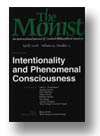
MONIST
Engaging the Future of Philosophy with TraditionMONIST is a prestigious academic journal published by Oxford University Press Inc, focusing on the intricate dialogues within the field of Philosophy. With an impressive impact factor that places it in the Q1 quartile of its category for 2023, MONIST stands as a leader in promoting high-quality research that bridges various philosophical traditions and methodologies. Established in 1973, the journal has consistently contributed to contemporary discussions by providing a platform for diverse philosophical inquiries and fostering rigorous scholarly debate. Although available through subscription options, MONIST engages a wide audience, including researchers, educators, and students who are deeply invested in advancing philosophical thought. Its Scopus ranking showcases its significant influence in the Arts and Humanities, positioning it at rank 119 out of 806 in its field, symbolizing an 85th percentile standing. With a commitment to excellence and innovation in philosophical scholarship, MONIST continues to be an essential resource for those seeking to deepen their understanding of philosophical issues in a rapidly evolving intellectual landscape.
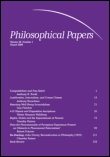
Philosophical Papers
Fostering Intellectual Growth in PhilosophyPhilosophical Papers, an esteemed journal published by Routledge Journals, Taylor & Francis Ltd, stands as a pivotal resource in the field of philosophy. Having established its presence since 1972, this journal has converged a wealth of intellectual discourse and contributes to the continuous development of philosophical thought until 2024. With a prestigious Q1 category ranking in the arts and humanities, and a notable 86th percentile ranking in Scopus's philosophy category, it underscores its commitment to rigorous scholarship and influential research. Although Open Access options are not currently available, the journal remains a vital platform for philosophers, researchers, and students aiming to engage with pivotal philosophical debates and advancements. Set in the UK, Philosophical Papers exemplifies the intersection of tradition and innovation in philosophical inquiry, making it an indispensable reference for anyone dedicated to exploring the complexities of human thought and existence.

Filozofska Istrazivanja
Illuminating Contemporary Philosophical IssuesFilozofska Istrazivanja is a distinguished open-access journal dedicated to the field of philosophy, published by the Croatian Philosophical Society. Since its inception, the journal has provided a platform for the dissemination of philosophical research, fostering scholarly dialogue and critical engagement within the discipline. With an ISSN of 0351-4706, this journal has been freely accessible to readers since 2005, reflecting its commitment to promoting knowledge and accessibility in the academic community. As measured by its Q4 in Philosophy category quartile for 2023 and its Scopus ranking of #770/806 in the Arts and Humanities field, Filozofska Istrazivanja continues to serve as a crucial resource for researchers, educators, and students alike seeking to explore contemporary philosophical issues and debates. The journal encourages submissions that contribute to various philosophical subfields, enriching the discourse and providing new insights that can elevate the understanding of philosophical thought.
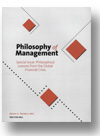
Philosophy of Management
Cultivating a Rich Exchange of Ideas in ManagementPhilosophy of Management, published by Springer International Publishing AG, is an esteemed academic journal dedicated to advancing the discussion and exploration of philosophical perspectives in management practices and theories. Established in Switzerland, this journal has become a pivotal forum for scholars, practitioners, and students alike who are interested in the intersection of business practices and philosophical thought. With a comprehensive focus across multiple disciplines, including Business and International Management, History and Philosophy of Science, and Organizational Behavior, the journal enjoys a competitive reputation, evidenced by its quartile rankings in categories such as Q1 and Q2 for 2023. The journal encompasses years of valuable contributions from 2003 to 2024, aiming to stimulate critical thinking and foster innovative ideas within the field. Researchers seeking to publish their work in a prestigious outlet with an engaged readership will find the Philosophy of Management to be an essential platform, affirming its importance in the wider academic community.

Philosophy of Music Education Review
Illuminating the Cultural Dimensions of Music LearningThe Philosophy of Music Education Review, published by Indiana University Press, is a premier academic journal dedicated to advancing the interdisciplinary discourse surrounding music education, philosophy, and the arts. With a notable impact factor dynamic, this journal has established itself as a significant voice, achieving Q1 rankings in both Music and Philosophy, and a Q3 classification in Education, reflecting its broad appeal and scholarly contribution. Covering prolific topics from 2019 to 2024, this journal offers insightful articles and critiques that stimulate critical thinking and enhance pedagogical practices within the realm of music education. It boasts impressive Scopus rankings in relevant categories, placing it favorably among its peers and showcasing its importance in the academic landscape for educators, researchers, and students alike. While it is not an open access journal, the philosophy and studies within its pages remain pivotal for those invested in the cognitive, emotional, and cultural dimensions of music teaching and learning.

Topicos-Revista de Filosofia
Exploring Diverse Philosophical Traditions and Innovative IdeasTopicos-Revista de Filosofia, published by UNIV PANAMERICANA, DEPT FILOSOFIA, stands as a significant academic platform within the field of philosophy, actively contributing to scholarly discourse since 2006 through its open access model. With an ISSN of 0188-6649 and an E-ISSN of 2007-8498, this journal is dedicated to fostering critical thought and philosophical inquiry in both regional and global contexts. Operating out of Mexico City, it provides a vital avenue for researchers, professionals, and students to engage with contemporary philosophical issues, reflected in its ranking of Q3 in the 2023 category for Philosophy and its position within the 33rd percentile among over 800 peer journals in the field according to Scopus. Topicos not only prioritizes accessibility to philosophical scholarship but also aims to propel academic discussions and elevate the standards of philosophical research. With coverage extending from 2013 to 2024, it invites contributions that bridge diverse philosophical traditions and innovative thought pathways, reinforcing its role as an influential resource for the philosophical community.

Revista de Hispanismo Filosofico
Advancing Conversations in Hispanic Philosophical ThoughtRevista de Hispanismo Filosofico is a pivotal academic journal dedicated to the exploration and analysis of philosophical discourse within the Spanish-speaking world. Published by Fondo Cultura Economica Espana S L, the journal serves as a reputable platform for scholars and researchers interested in the intersections of philosophy and cultural studies, aiming to highlight significant contributions and debates in the field. Although the journal is registered under ISSN 1136-8071, its rich content is not open access, reflecting a commitment to maintaining high academic standards while ensuring that readers engage with quality philosophical literature. With its designation in the Q4 category for philosophy and a current rank of #760 in the Scopus Arts and Humanities database, the journal is committed to fostering an understanding of Hispanic philosophical traditions and contemporary thoughts. For researchers, professionals, and students alike, Revista de Hispanismo Filosofico is an essential resource for expanding knowledge and contributing to ongoing philosophical conversations.